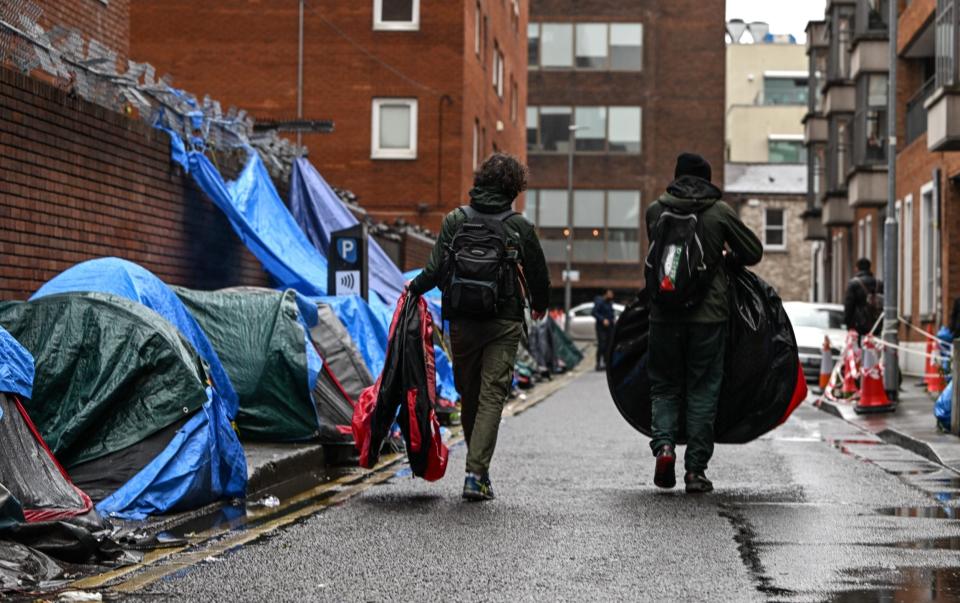Ireland rejects Sunak’s offer to take part in Rwanda scheme

Ireland has rejected Britain’s offer for it to take part in the Rwanda plan, amid further tensions between Dublin and London over migration.
Officials poured cold water on the offer, ahead of Simon Harris’s first visit as Irish prime minister to Northern Ireland on Friday.
His visit to the region risks being overshadowed by a row triggered by Irish claims that up to 90 per cent of asylum seekers arriving in Dublin have crossed the open border with Northern Ireland because they fear the Rwanda plan.
Mr Harris has said Rishi Sunak must uphold an agreement to take back migrants but the Prime Minister insists the Common Travel Area arrangements are not legally binding.
“If the Irish government believes the Rwanda plan is already having an effect, we can explore Ireland joining the Rwanda scheme,” a Downing Street source said on Thursday.
Standing outside Stormont Castle, Mr Harris said the offer was “more satire than news” as he dismissed it.
Dublin officials dismissed the British offer as “spin”. They told the Irish Independent that no formal offer had been made and that the Tory government knew Ireland would reject it anyway.
Earlier, Mr Harris criticised anti-immigration protesters who gathered outside his home Wicklow on Thursday night.
“I always think people’s families and people’s homes should be out of bounds, he said.
“It was bedtime for my kids last night when this situation arose. I don’t think it’s appropriate.”
Other politicians’ homes have also been targeted by anti migrant groups. Mr Harris was not at home when the protest happened.
The briefing came after Micheál Martin, the deputy prime minister, warned opposition MPs not to be taken in by the “Right-wing Tory press”.
Mr Martin denied accusations that Dublin had spread confusion by ordering police to border areas and had handed Mr Sunak a “PR boon” before the local elections in the UK.
“We’ll see by the end of the night whether it’s been a PR boon or not,” he said ahead of early results that pointed to a crushing Tory defeat.
The decision to redeploy police close to the border, but not on it, sparked accusations from Mr Sunak that Ireland was “cherry-picking” international agreements.
He demanded reassurances there would be no checkpoints on the invisible 300-mile frontier, which Ireland gave.
Dublin had insisted that the Irish border be kept open during the Brexit negotiations to protect the peace process. This led to the UK-EU agreement creating an Irish Sea border between Northern Ireland and Britain.
As the row deepened, it was reported that Helen McEntee, the Irish justice minister, had told a Cabinet sub-committee that rising numbers of Nigerians arriving in Dublin from the UK faced deportation to Nigeria, rather than back to the UK.
She blamed a High Court judgment that said Britain was not a “safe country” to return migrants to, which she has brought forward legislation to circumvent.
Ms McEntee, who is under pressure over her handling of migration, was warned as early as 2022 that the Rwanda plan could lead to an influx of migrants to Ireland.
The Irish Times said officials briefed Ms McEntee that the Rwanda scheme could make Ireland “an attractive alternative”.
Tensions over immigration are high in Ireland, a country of about 5.1 million people, which is struggling with a housing crisis and has welcomed more than 104,000 Ukrainian refugees since Vladimir Putin’s illegal invasion.
More than 6,000 people applied for asylum in Ireland by April 12 this year alone. If that rate continues, Ireland would have a record number of more than 20,000 asylum claims by the end of 2024. The previous record was 13,000 in 2004.

 Yahoo Sport
Yahoo Sport 






































